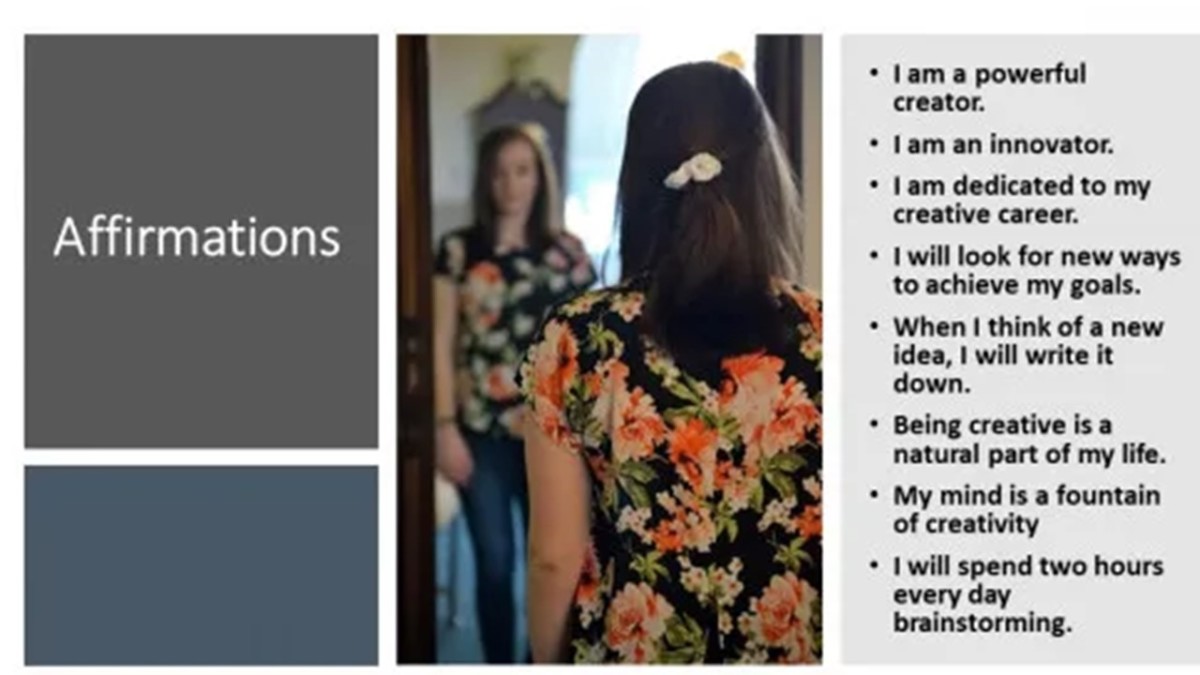Loving You: Turning Negative Self-Talk into Positive

Negative Self-Talk: The Story of Bertha
When it comes to the idea of negative self-talk, I am reminded of a student I once taught during my nearly twenty-year career as a university professor. We’ll call this student “Bertha,” even though that is not her real name. Bertha was one of those students who seemed to prefer the cheap real estate at the back of the class. Teachers all know that some students end up there by chance, others by choice. As soon as I got to know her a bit, I realized Bertha was in the second group: She was there by choice. And not to my surprise, she seemed most comfortable in the farthest corner of the back row.
Everything about Bertha screamed "I need to learn to have confidence in myself!" and, "I need to speak kinder words to me, about me." Her demeanor, where she chose to sit in my classroom, and her actions during class. It seemed to me that she did everything she could to avoid making eye contact with me and her fellow classmates, and she never raised her hand when I asked a question. Still, I could tell she was a bright student (over the years, as a college professor I developed the ability to "read" students based on many factors). Not only did I believe Bertha was a bright student, I also felt she really wanted to participate in class, but for some reason, she just would not allow herself to do so.
I was certain something was holding Bertha back, and I was almost certain that whatever was keeping Bertha inside her "shell" was something that was in her mind; something neither I nor any of her other professors or fellow students could see.
This Hub article is about negative self-talk, and how it can be a destroyer of self-confidence. It is the story of Bertha, a college student, and it provides a good example for us to look at and to consider as we examine ways to counter negative self-talk.
All of our actions are in our heads before they materialize in our lives. Before you get out of bed in the morning, you probably say or think, “It’s time to get up. I have to get out of bed and get ready for (whatever)." Every decision you and I make each day before engaging in an activity, begins as a thought in the mind. Granted, most work-day morning activities are already part of your daily routine and take almost no thought at all. Still, each activity is ignited by a thought. And it is because all our actions are ignited by thoughts that it is important to think, sometimes, about what you are saying to you.

As a college professor, I always did my best to get to know each of my students as well as possible, so I always paid close attention to their behavior, as well as to their class participation habits. I usually knew, early on as class began, who was eager to participate, who would participate fully with a little coaxing from me, who would participate only if it was completely unavoidable, and finally, those it seemed would choose to stand before a firing squad rather than be asked a question and expected to participate in class. Sadly, Bertha was a student who fell into the latter group.
At the end of every class, I always told my students not to hesitate to come and see me during my office hours if there was ever anything from class they would like to discuss further, or if there was anything related to the class or the course they believed I could help them with.
After about the third or fourth week of the semester, one day I was in my office preparing for class with about an hour to spare before I had to go and teach. The door to my office was slightly ajar, and I noticed there seemed to be someone lingering near it. No one had made an appointment for that hour, so I continued to prepare for my class. I figured if someone wanted to see me, they would either knock, or would peep their head inside to see if I was available to speak with them.
After around five minutes of shadowy lingering, Bertha finally stuck her head in and said, “Dr. Middlebrook, may I come in?”
“Why yes, Bertha,” I said. “Come right in and have a seat.” I motioned an offer for her to sit in one of the two spare chairs I kept in my small faculty office.
“I can see you’re busy,” she said. “I promise I won’t take up much of your time.”
“Don’t worry,” I said. “I have plenty of time before my next class.” I knew it had taken an enormous about of internal deliberation for her to come this far, so I wanted to make sure she felt as comfortable as possible, now that she had finally made it all the way inside my office.
“I just wanted to talk to you about why I haven’t been participating in class discussions,” she said. She frowned, and then looked down at books she’d placed on her lap. “Or in any of my classes,” she added quickly.
She was extremely shy and reticent, so I felt it would be best for me to say as little as possible, initially. After a long moment of silence, I said, “I just finished grading the papers from last week’s quiz, and guess what?
“Did I pass?” she asked.
“You did,” I said. “In fact, you made one of the highest scores in the class.”
Toxic Effects of Negative Self-Talk
After I said, “In fact, you made one of the highest scores in the class,” some of the sadness retreated from Bertha’s face, but her head was still pointed down toward her lap. I continued.
“Based on your test score, it would appear that you are paying attention during lecture-discussion, and that you’re learning the material. So why is it you don’t participate in class discussions? You know participation is part of your grade, right?”
She nodded affirmatively.
“And that not participating in discussions will count against you?”
“I know,” she said, finally lifting her head and looking in my direction. “And I try, but … I try to raise my hand sometime … and it’s just that … I’m always afraid everyone will stare at me, and laugh, if … I say the wrong thing.”
“Has that ever happened to you?” I was hoping to find out why she felt this way.
“No,” she said, looking back down at her books, as if a weight was sitting on top of her head, and it had finally become too heavy to even try to lift it.

“Then why would you think that?” I asked.
“It never happened to me … because I never raise my hand,” she said. “But it happened once to a friend of mine, and I guess I never forgot it. We had a class together, a big one, in the auditorium. My friend, she was always eager, to talk. She just wanted to make a good impression on the teacher … I guess. But when the teacher called on her, her response was nowhere near what the teacher was asking about, and everyone in the auditorium laughed at her. People teased her for days, and since then, I’ve always made sure nothing like that ever happens to me.”
Purely out of curiosity, I asked, “When did that happen to your friend?” Bertha was taking advanced junior-level college classes, so I presumed she was at least in her third year, as were most of the students in my class.
“When I was a freshman,” she said. “About three years ago.”

I couldn’t believe what I’d heard. “You mean to tell me you’ve never participated in class discussions, and you’re almost a senior?” I asked.
“If I’m called on, and I have no other choice, I participate,” Bertha said, smiling, but still holding her head down, hiding her eyes. “But … if they don’t call on me … I just never want that to happen to me. You see it was a large class, and what happened to my friend was so embarrassing. She cried for two days after that.”
“I see," I said. "And what happened to your friend after she stopped crying over what happened?”
“Oh, she got over it," she said. "After that, she never even talked about it, unless someone else brought it up.”
“I see. So it didn’t really scar her for life?”
“Oh no.” she said. “It didn’t … I don’t think it even scarred her for a week. She was laughing about it the next week. But I know she felt embarrassed when it happened, and after too. She just felt like it was best to start laughing about it along with everyone else, so people wouldn’t tease her.”

Challenging Negative Self-Talk
“Oh,” I said. “So your friend neutralized the power of the incident.”
“What?” Bertha asked.
“Well,” I said, “She neutralized the power of the incident,” I repeated.
“Neutralized?” she asked.
“By laughing along with everyone else, she took away any power that incident could have over her. No one could tease her about it, because she agreed with them that what happened was a funny situation.”
“But … they shouldn’t have laughed at her,” she said.
“Doesn’t matter,” I chimed in. “It was a large class, and there’s a lot of stress and tension in a class like that. People want something to break some of that tension, so when something happens that seems even a little bit funny, everyone laughs. And you said your friend is someone who thinks she always knows the right answer?”
“Yes, but,”
“She was overly eager to speak, to show off what she thought she knew?”
“Well, yes, but,”
“And when she spoke, the teacher let everyone in the class know her answer was incorrect. Bertha,” I said, “in a classroom environment like that, something like that can seem to be a funny thing.”
“I never thought about it like that,” Bertha said. Then she held her head up, smiled, and looked directly at me. “I just always think about how embarrassed she must have felt to have everyone laugh. I never want to feel that kind of embarrassment in class.”

“The problem is not what happened that day,” I said.
“It’s not?” Bertha asked, still smiling and looking me in the eyes.
“No. I think the problem you have is how you think about what happened to your friend. Your fear is all about what might or might not happen if you speak in class. You’re allowing negative thoughts about something that hasn’t happened, to keep you from participating in your classes. Tell me this,” I said. “What would happen if you were to raise your hand, and I called on you, and you spoke, and what you said was the correct answer? What would happen then?”
After that, Bertha said, “Well, I guess if what I said was correct, nothing bad would happen.”
“Then I’ll make a deal with you,” I said. “If you raise your hand during a class discussion, I promise you that no matter if what you say is correct or not, I will respond in a way that will not cause you any embarrassment.”
“You mean, no matter what I say, you will agree with me or say it is correct, even it’s not?”
“No. I couldn’t do that,” I said. “But I promise you that every word that comes from my mouth will be positive, and I won’t say anything to make you feel bad, even though I would have to explain to the class the response I’m looking for. Do we have a deal?”
After a few seconds of silence, I felt Bertha needed something she could do, in the moment, to begin replacing negative thoughts with positive ones.
“And, there’s something you could do,” I said, “that’s guaranteed to help you feel more confident when you have something to say in class.”
“Really?” Bertha asked. “What?”
“It’s what Thoreau talked about.”
“Henry David Thoreau?” she asked. “We learned about him in my philosophy class.”

“Well,” I said, “Thoreau said the secret to achievement is to hold a picture of a successful outcome in your mind. So why don’t you try doing that? Instead of thinking negative thoughts, and instead of talking yourself out of participating in class, why not picture a successful outcome instead. Picture yourself responding to a question, and then picture everyone, including me, agreeing with what you have to say. Picture your comments adding to our class discussion in a positive way.”
Bertha held her head down again, but this time, she seemed to be thinking instead of hiding her eyes. After a few seconds, she looked directly at me again and said, “Dr. Middlebrook, I think I can do that … so I guess it’s a deal.”
In class that very next week, Bertha raised her hand not one, not two but three times, and every time I called on her, she was right on point with her responses to my questions. Not only did she demonstrate that she understood the lessons, it was obvious she had done extra reading and research. Her comments were not only correct, she added facts and insight that was not presented in the course text or in handouts I’d passed out. I was so proud of her.
A few weeks later, Bertha came by my office once again, but this time instead of lingering outside my door, she knocked, peeked her head in boldly and asked, “Dr. Middlebrook, may I come in for a minute?”
“Come right in Bertha,” I said. I was so glad to see her sporting a new sense of self-confidence.
“I just wanted to say ‘thanks,’ for helping me,” she said.
“I didn’t do anything,” I said. “You did it. You found your confidence, and you conquered your fear of speaking in my class. Seems to me you’ve learned how to replace negative thoughts with positive ones.”
“But I couldn’t have done it if you hadn’t helped me see what I was doing to myself.”
“I only pointed it out,” I said. “You did the rest.”

“But I never would have even realized it if you hadn’t taken the time to talk to me about it. Before, I never thought about how it was something I could control.”
All of Bertha’s fears about speaking up in class were based on self-defeating negative thoughts that were all in her mind. This student had never actually gone through the humiliation of being laughed at by a classroom full of students. She had only imagined that this could possibly happen to her.
She was allowing something that had happened to someone else, several years earlier, to loom before her as a dire prediction of her future. In effect, she was relinquishing her ability not only to influence her own thinking, but also her ability to influence her performance as a student in my class.
I’m happy to report that Bertha passed my course with flying colors, and I can only hope that the rest of her college days were just as successful as her days in my class.
Keeping a positive state of mind does not always come easily, as Bertha’s story illustrates. But being positive about your abilities, your future, and even about negative things that might have happened to you in the past, is something you, and the rest of us, need to practice daily. If you constantly tell yourself you are not worthy, or that you cannot do something, you are allowing your mind to prepare your body to follow its reasoning, and then negative reasoning becomes the command from your mind, to your body. The truth is that, at the end of the day, we believe what we tell ourselves to believe. For this reason, the mind can be our most powerful enemy, or it can be our most loyal, powerful, and trustworthy ally.
© 2012 Sallie B Middlebrook PhD








